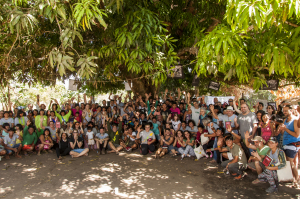Seed by seed, forests can be preserved

Workers from ISA team, collectors from the Xingu Seeds Network, residents of the Diauarum Pole and members of the Xingu Indigenous Land Association – Photo: © Claudio Tavares / ISA
Among the challenges to preserving the Amazon, there are many initiatives to combat deforestation that are inspiring. One of them is the association Rede de Sementes do Xingu (Xingu Seeds Network), which brings together groups of native seed collectors formed by indigenous people and family farmers.
They have a single objective: to collaborate with forest restoration in the Amazon and the Cerrado regions.
The work at Rede de Sementes do Xingu is based on individual effort and the true importance of collecting every single seed. The strength that is formed from the network spirit results in a history that completes 15 years in 2022, with 294 million seeds collected.
The network currently has more than 560 collectors from different origins, histories, cultures and languages, located in different territories in the Xingu, Araguaia and Teles Pires river basins, in Mato Grosso.
According to a report published by the Terra website, the 294 tons of seeds that were collected and sold are responsible for an increase of about 25 million trees in 7,400 hectares of forests. In addition to contributing to environmental preservation, the work of Rede de Sementes do Xingu also generates income for the collectors.
The seeds collected under the program are used by rural landowners who need, by law, to recover part of their properties with native vegetation in Brazilian permanent preservation areas.
Other information about the Network:
- The association collects seeds from over 220 native plant species
- R$ 5.3 million transferred directly to collectors
- About 60% of the Xingu Seeds Network workforce is made up of indigenous women
- Indigenous collectors live in three territories: Marãiwatsédé, Pimentel Barbosa and Xingu
- The collectors of native seeds live in 21 villages of the Ikpeng, Kawaiwete, Matipu, Xavante, Waujá and Yudjá peoples.
- Family farmers live in 16 settlements and represent around 32% of the workforce.
You can find this and more information about Rede de Sementes do Xingu at the following links:
https://www.sementesdoxingu.org.br

Leave a comment